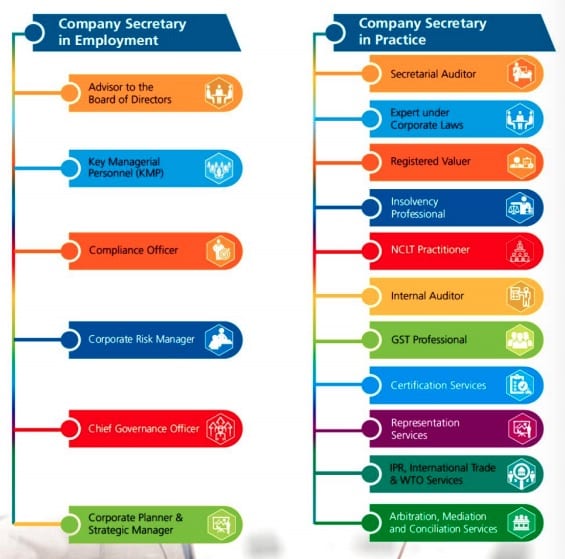Every private company which has a paid up share capital of ten crore rupees or more is required to appoint a whole-time company secretary. Further, Every listed company and every other public company having a paid-up share capital of ten crore rupees or more shall have whole-time key managerial personnel (KMP), the term KMP includes the
i. Managing Director (MD), or Chief Executive Officer or manager and in their absence, a whole-time director;ii. Company Secretary (CS); andiii. Chief Financial Officer (CFO)
The Company Secretaries are referred to as KMP along with MD/CFO in a senior managerial category who has the direct access to Board of the Company and Guiding the board on the various business related matters. Company Secretary is a strategist, Compliance Officer, Chief Governance Officer and Key Managerial Personnel of the Company and is appointed by the Board of Directors to ensure that the organization complies with all the legal and regulatory influencing the business activities. Company Secretary acts as an interface between internal and external stakeholders of the company. He guides the Board of Directors on management and administration of the Company, statutory compliances and on various other matters such as business policies, strategic planning, formulation of risk management and risk mitigation strategies, corporate social responsibility, sustainability reporting, brand equity, image building etc. Beside these, the roles and responsibilities of the Company Secretary have grown immensely in other areas as well, such as : Arbitration, Mediation and Conciliation Services, Insolvency Professional, Registered Valuer, Preparation of Diligence Report for Bank etc. As the profession of Company Secretaries provides world of opportunities, the preparedness to be a successful company secretary needs to be initiated right from the entry level of the profession. The Institute has structured the course curriculum and the training requirements suiting the industry demands. The initiative is required from the students as well in continuously improving themselves with the technical, soft and business skills necessary for the profession. Recommended
Basic Principles of AccountingAccounting ConceptBook KeepingRevenue ExpenditureBusiness CommunicationProfit Centre
